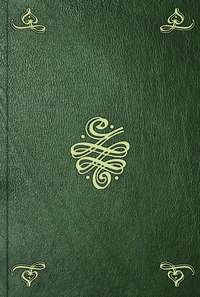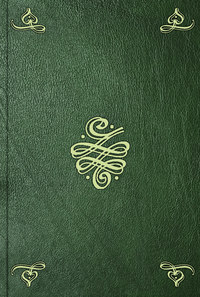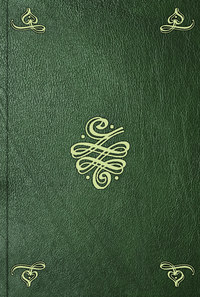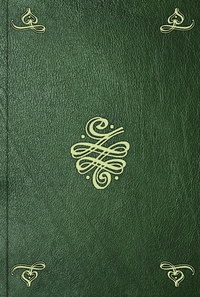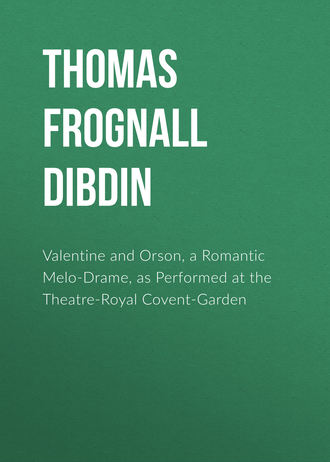 полная версия
полная версияValentine and Orson, a Romantic Melo-Drame, as Performed at the Theatre-Royal Covent-Garden
SCENE II.—An Apartment in the Palace. (Phillips.)
(Laughing heard without.) Re-Enter HugoHugoHa! ha! ha! the wild man has began to shew his breeding with a vengeance – he has overturned the kitchen, set the cellar afloat, and sent every thing in the stable to rack and manger; for he hath eaten the beast's provender, given wine to the horses, and thrown the cook into the dripping pan, where he basted him with his own ladle.
Enter AgathaAgathaAh, Hugo – what, are you laughing at the wild man? I'm sure he frightens me.
HugoHe'd have frightened you more, if you had seen him, as I did, in his own dining room in the forest.
AgathaWhy now, really, had you courage enough to venture there?
HugoTo be sure I had – I went in boldly – by mistake.
(Aside.)AgathaWhen he was out, I suppose?
HugoO, no; he was there, and wanted me to stay. I took off my cloak to oblige him, and to avoid ceremony, came away without it. Your lady may well be glad that Valentine had power to tame him.
AgathaGlad! she's more uneasy than ever; and if she hasn't fallen out of love into jealousy, I'll give you leave to say that Agatha is no conjuror.
HugoI'm sure I never said you was one: but who is she jealous of?
AgathaYou shall hear. The Duke of Acquitane has arrived to beg relief against a pagan, they call the Green Knight, who holds his daughter unlawfully a prisoner, and unless, by a certain hour she is rescued, she will be forced to marry this Saracen monster, who has already vanquished and hanged up twenty knights who fought for her.
HugoPoor fellows! And what is he to have who conquers the pagan?
AgathaThe lady's hand.
HugoHanging on one side, and marriage on the other! bless me! Where could they find twenty knights mad enough to undertake such a terrible alternative?
AgathaWhy; your master, Valentine, will go, if it's only for the honour of the thing: and the Princess is distracted lest he should fall in love with the lady, or be killed by the knight.
HugoAnd for fear he shou'd once more ask me to bear him company I'll get out of the way as fast as possible.
(Going, meets the Princess.)EglantineHugo, where are you going?
HugoI'm going, madam, to – to unarm my master before the banquet, and fear I shall be too late.
EglantineHold, sir – Can you be secret?
HugoAsk Agatha, your grace's hand-maid – she knows I can.
AgathaI know you are a blockhead. Mark my lady.
EglantineCan you not bring, Sir Valentine's armour to Agatha's apartment?
HugoAye, madam, if she be there to receive it – but when, and how long must I —
AgathaHow rude of you to want to know more than I do – Go, fetch the armour, quick!
EglantineAnd here's a purse of gold to speed thee.
HugoI lack no spur but your commands, and a kiss from Agatha.
AgathaNo, no – (he is going away) Well, take it.
HugoNow, why did you say no, no?
AgathaWhy, one must refuse at first for decency.
EglantineHere, Hugo.
[Gives the purse.Hugo[Takes it.] Madam, I'm gone.
Agatha[Apart to Hugo.] I thought you didn't want the money.
HugoOne must refuse at first, you know, for decency.
[Exit.EglantineIn Valentine's disguise I'll see this beauty he would venture for; – for, should he conquer in the fight, how many Cupids smiling, through her tears, may aim at Valentine! And, shou'd he fall —
AgathaIt wou'd be a sad thing, truly, my dear lady; but how will your going help it?
EglantineThere is a prophecy, that no man nursed by woman can subdue this pagan – Perhaps it is his fate to fall by woman.
AgathaHe wou'dn't be the first if he did, madam.
EglantineMy mother's martial spirit trained me up to Amazonian sports – Foremost in the chace, thrice have I pierced the monarch of our woods; and, more than once, have been where battles roar, and undismayed, beheld the mortal conflict.
AgathaI shou'd have been frighten'd out of my wits.
EglantineBy force or stratagem it may be mine to free this lady, and save my lover from a double danger.
AgathaBut will he go, knowing this prophecy?
EglantineHe disregards it as an artful fable, coined by the Saracen; or else as pagan sorcery, which he, a christian knight, fears not to combat with. Come, thou, as my page, shalt follow me, and learn my purpose on the journey.
AgathaMe!
Enter HugoHugoThe armour is all in Agatha's apartment, your highness. My master had taken it all off before I came.
AgathaBut, madam, wont you go to the banquet, you purposely provided for the king and Valentine?
EglantineNo time for feasting now – obey my orders – We'll to the Green Knight's Camp – Away, my girl.
[Exit."Agatha"With all my heart. Its my opinion my lady is so in love, that, to save Valentine from danger, she'd follow him to the world's end.
"Hugo"I dare say she would, but when I am in danger nobody talks of following me.
"Agatha"No; that's impossible – you run so fast.
DUET. —Hugo and Agatha"Hugo.The man who fights and runs away,"Agatha.Wou'd make a sorry lover,"Hugo.May live to fight another day,"Agatha.But ne'er his fame recover."While he who boldly meets the foe,"Hugo.May boldly die, 'tis true,"Agatha. Will live in history, you know,"Hugo.I'd rather live with you."Nay come I'll boldly meet the foe,"Agatha. I'll love you if you do;"Hugo.And when to fame I'm wed you know,"Agatha. Then I'll be wed to you."Both.Then I'll be wed to you.II"Agatha. The hero slain, claims beauty's tear,"Hugo.Her smiles more pleasure giving;"Agatha. She holds his mem'ry ever dear,"Hugo.And marries some one living."But come, I'll bravely meet the foe, &c."[Exeunt."SCENE III.—A grand Banquet under Pavilions in the Palace Gardens. (Hollogan.)
The King; and Valentine (unarmed) discovered in great state, Nobles and Ladies seated at the Banquet Tables, &c.
Orson enters, pleased at the sight, goes from one table to the other – the King orders him wine, he imitates their manner of drinking – takes another cup, is going to drink, Valentine tells him to be careful, pointing to his head, indicating that wine will intoxicate him, Orson does not understand him – a Servant entering with wine, he forces it from him, and goes off with it – the Princess's Ladies enter, much alarmed at missing her, and bring with them her cloathes.
Valentine calls for Hugo, who informs him that the Princess bribed him to let her have Valentine's armour to go to the Green Knight's camp —Valentine, goes off, followed by the King, &c. in search of Eglantine. – Orson re-enters, and from the effects of the wine, appears half intoxicated —Hugo sits down at the table, pours out a goblet of wine, when Orson suddenly takes it out of his hand, shewing him, by pointing to his head, in Valentine's manner, it is not good for him; he misses Valentine, runs anxiously about, seems to enquire of Hugo, looks under the tables, and in every place, and at last tears his hair, stamps, and throws himself on the ground —Hugo, alarmed, runs off. —Orson rises, once more looks about for Valentine, and not seeing him, goes distractedly off, leaping over the tables, and overturning all before him.
SCENE IV.—A Wood. (Richards.)
Enter Agatha, dressed as a PageAgathaThere goes my lady, drest and arm'd so like Sir Valentine, that if he were to meet her, he'd think it were a second self. She bade me follow at some distance to avoid suspicion, and mislead any who might pursue her – I fear she will prove but a weak defender of the poor Lady Florimonda, who, if Sir Valentine do not quickly overtake us, must, of force, be married to the pagan sorcerer.
ROMANCE'Tis far away o'er yonder plains,A cruel pagan tyrant reigns,And holds a christian maid in chains,Ah, well-a-day, poor lady!IIAnd ev'ry day some gallant knight,Who strives to win this lady's right,Is by the pagan slain in fight.Ah, well-a-day, poor lady!IIIAnd ere the sun forsake the sky,Unless more powerful aid is nigh,The pagan she must wed, or die.Ah, well-a-day, poor lady!IVAnd, now, fair Eglantine is gone,By jealous pangs her bosom torn,To save her love, or die forlorn.Ah, well-a-day, poor lady

